Africa-Press – Botswana. The success of the innovative Ecosystem-Based Adaptation and Mitigation project in Botswana’s communal rangelands hinges on robust stakeholder participation, officials have emphasised.
The five-year initiative, spearheaded by the Ministry of Lands and Agriculture in partnership with Conservation International (CI) and other key players, is transforming 52 villages across Ngamiland region, covering 20 villages in the North West District and the remainder in the Okavango District.
Addressing a stakeholder meeting held Monday in Maun, CI country director Ms Portia Segomolo highlighted the community-driven nature of the project, which aims to restore degraded rangelands, curb greenhouse gas emissions, and bolster the resilience of vulnerable households against climate change impacts.
“Climate change is real, and North West District is no exception. Prolonged droughts, heatwaves, water shortages, and bush encroachment are affecting our communities, especially those dependent on livestock and crop production,” Ms Segomolo said.
She noted that cattle numbers remain high in Ngamiland, with communities largely engaged in subsistence farming, which climate disruptions threaten to undermine further. The project, she said, was designed to empower communities by promoting climate-adaptive interventions and resilient livelihoods.
“We need everyone’s commitment to do this right,” Ms Segomolo urged. “If properly implemented, it can dramatically improve the livelihoods of our farmers. With continued support, funding partners can extend these efforts into other areas.”
The project’s implementation involves integrating climate-responsive planning into existing government frameworks, including district development committees. Mr Bueno Mokhutshwane, the Ministry’s project focal person, outlined its core components: strengthening institutional support for climate management, rehabilitating rangelands, improving livestock practices, and fostering policy transformation to sustain low-emission development.
“Our goal is to build resilience and enhance community livelihoods through these measures,” Mr Mokhutshwane explained. “Success depends on our collective effort.”
Conservation International’s deputy chief of party, Dr Nkosi Moleele, emphasised the importance of capacity building, particularly in livestock management, to enable farmers to market their cattle at premium prices. Given that around 70 per cent of rural households rely on rain-fed agriculture and livestock, he stressed that the project is vital for sustaining Botswana’s economy and environmental health. As the region continues to grapple with the relentless effects of climate change, officials remain optimistic that collaborative efforts can foster a more resilient and sustainable future for Botswana’s communities.
For More News And Analysis About Botswana Follow Africa-Press






